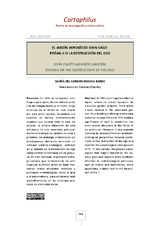El jardín japonés de John Cage: Ryōan-ji o la destrucción del ego
John Cage’s japanese garden: Ryoanji or the destruction of the ego
Autor
Molina Barea, María del Carmen
Editor
Universidad de MurciaFecha
2020Materia
Cage, John, 1912-1992Ryōan-ji
Jardín japonés
Budismo Zen
Estética
Ontologías
Japanese garden
Zen Buddhism
Aesthetics
Ontologies
METS:
Mostrar el registro METSPREMIS:
Mostrar el registro PREMISMetadatos
Mostrar el registro completo del ítemResumen
En 1962 el compositor John Cage viaja a Japón, donde visita el jardín Zen del templo Ryōan-ji en Kioto. Surge entonces en el artista un vivo interés por este jardín japonés, forjándose una relación de hondo hermanamiento creativo que duraría toda la vida del músico. La amplia dimensión de esta influencia ha sido abordada principalmente en trabajos de carácter musical o pictórico. Sin embargo, el alcance de sus implicaciones demanda asimismo un enfoque estético-ontológico, centrado en el estudio de la destrucción del ego como entidad fundacional del yo psíquico. En este contexto, el presente traba-jo sostiene que la fascinación de John Cage por el célebre jardín de Kioto trasciende meras afinidades estéticas o principios metodológicos, como el azar y el automatismo, para enraizarse, más específicamente, en los complejos procesos de disolución del yo. In 1962 John Cage travelled to Japan, where he visited Ryoanji’s fa-mous Zen garden in Kyoto. There arises a keen interest in the celebrated gar-den, thus building a lifelong relationship based on mutual influence. The creative significance of such a connection has been widely discussed in the fields of art and music. However, it also urgently needs to be analyzed from an aesthetic-ontological perspective, focused partic-ularly on the destruction of the ego as a basis for the psychological development of “I”. In this context, the present paper argues that Cage’s fascination for Ry-oanji goes well beyond mere aesthetic affinities or methodological principles, such as chance and automatism. More specifically, it takes root in the dissolu-tion of the ‘I’.

